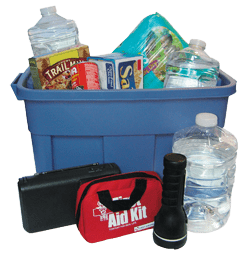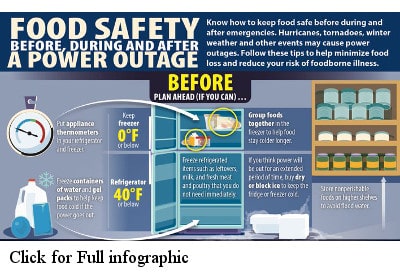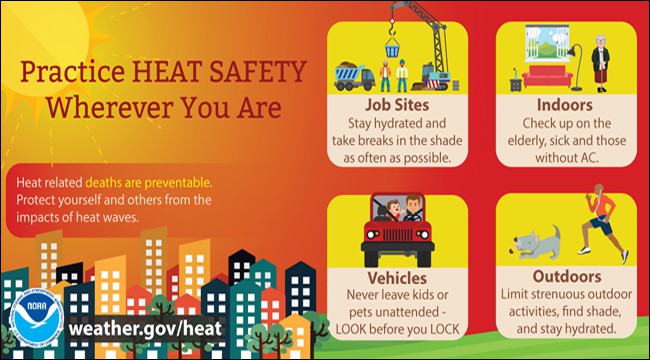How To Stay Safe During a Power Outage

Keeping our loved ones safe during inclement weather is a top priority no matter where we live. Power outages that strike in the middle of a heatwave are just as dangerous as a power outage in the dead of winter. A standby generator would eliminate the power outage problems entirely, but not everyone has installed one in their home.
In the event that you’re still waiting to get a natural gas generator from Norwall, you can prepare your family for a power outage by practicing these safety tips.
Related Topics
Put Together an Emergency Kit
 Don’t wait for doomsday to prepare for the worst. Emergency Preparedness experts recommend keeping enough food, water and other essential items to last your family for at least 72 hours or longer during an outage. A few items to include are: a flashlight (don’t forget the batteries), a portable radio (more batteries), one gallon of water per person per day, non-perishable foods and canned goods, extra clothing, board games and cards to pass the time, first aid kit, and more.
Don’t wait for doomsday to prepare for the worst. Emergency Preparedness experts recommend keeping enough food, water and other essential items to last your family for at least 72 hours or longer during an outage. A few items to include are: a flashlight (don’t forget the batteries), a portable radio (more batteries), one gallon of water per person per day, non-perishable foods and canned goods, extra clothing, board games and cards to pass the time, first aid kit, and more.
Make smaller versions of this kit for your office or car and fill it with items that are practical for those environments. Don’t forget to include food and water for your pets.
Norwall’s Winter Emergency Preparedness Checklist has information for more complete Emergency Kits.
Protect Your Refrigerated Food
 When the power goes out and temperatures soar, avoid opening the refrigerator or freezer unnecessarily. Keep the doors closed to keep the cold air in and the warm air out. A full refrigerator should stay cold for at least 4 to 6 hours and a freezer an entire day or longer. Don’t worry about tasting food to see if it’s okay. Throw away perishable food that rose over 40 degrees for more than two hours.
When the power goes out and temperatures soar, avoid opening the refrigerator or freezer unnecessarily. Keep the doors closed to keep the cold air in and the warm air out. A full refrigerator should stay cold for at least 4 to 6 hours and a freezer an entire day or longer. Don’t worry about tasting food to see if it’s okay. Throw away perishable food that rose over 40 degrees for more than two hours.
The best rule of thumb—if you’re unsure if the food is safe, throw it away. Spoilage is often detectable by the odor, but dangerous food-born bacteria usually has no odor at all. Botulism is often deadly, but the toxin which is produced by bacteria, has no odor at all and food will taste and smell perfectly fine.
If you have a freezer, add some gallon water jugs filled about three-quarters full. Put the lids on after they are frozen. When an outage strikes, put several in your refrigerator if there is room and leave the rest in your freezer. They will help keep the refrigerator cold if the outage lasts more than four hours.
Best Home Generators for Hot Climates
Stay Cool - Avoid Overheating
 If the power goes out during a heatwave emergency, stay in the lowest level of your home where it is coolest. Opt for light-weight, light-colored clothing and avoid anything heavy or dark. Be sure to drink plenty of water even if you’re not thirsty. Don’t forget that pets need food and water too.
If the power goes out during a heatwave emergency, stay in the lowest level of your home where it is coolest. Opt for light-weight, light-colored clothing and avoid anything heavy or dark. Be sure to drink plenty of water even if you’re not thirsty. Don’t forget that pets need food and water too.
Take advantage of options outside your home if the heat becomes overwhelming.
- Visit an air-conditioned movie theatre or store. It will help cool you off while giving you something to do.
- Many cities set up cooling shelters in hot weather. Listen to local news on your portable radio for information. Your smart phone is another resource for official, local information.
- Public swimming pools are another place to cool off, even if you don’t swim. They have shallow water where you can wade in to a depth that makes you comfortable.
- Visit the beach where cooler breezes and water can help cool you down.
- Not comfortable with beaches or pools? Take a cool shower or bath.
Whichever option you choose, don’t forget that your pets need to cool off too. For them, that might mean a cool bath even if they don’t like it.
Winter Power Outage
A short power outage when temperatures range from thirty-two to sixty degrees won’t have a big impact on your home or family. As the temperature in the house drops, put on a sweater or wear a hooded sweatshirt. Keeping the back of your neck and your head warm will keep you warm even when it is chilly. If you keep the house closed, it will take a long time for the temperature to fall. Keep the refrigerator and freezer closed except to add ice blocks from your freezer.
From zero to thirty-two degrees, temperatures in the house fall faster. An outage that lasts more than four hours may take the house temperature into the uncomfortable range where a sweater or hoodie won’t keep you warm enough. Avoid the temptation to use a heater not rated for indoor use. Read instructions and warning carefully.
When the house temperature drops below thirty-two, action is required to keep pipes from freezing. Open each hot and cold faucet enough for a drizzle of water slightly more than a fast drip to keep the pipes from freezing.
Unless you are equipped for winter camping, below thirty-two degrees in the house is more than enough justification to seek shelter in a hotel, motel, or with another family member. Shut the water off at the main valve, open all the faucets, flush the toilets, and leave. Take your emergency kit, your food and water, and enough clothes for several days.
Best Standby Generators for Cold Climates
Know When to Leave
Nobody wants to leave their home, but sometimes the situation becomes so bad that you must do just that. If the power has been out for a few days and the heat or cold become overwhelming, the time has come to take further action. Take your family someplace to stay until the electric utility restores power.
- Visit a family member or friend who still has working electricity.
- Check-in at your local emergency shelter. City shelters should have power from emergency generators, hot food, water, and other essentials you might need.
- Spend a night or two in a hotel. Many have pools which is a bonus in a heat wave. The downside is that several nights in a hotel can add up to a substantial bill for the average family.
If you must leave, tell your family and extended family where you are going. Choose an option that allows you to take your pets along. Be sure to check with shelters to find out if they allow pets. Many do not.
How to Use a Portable Generator for Emergency Power

Portable Home Backup Generator
A portable generator can provide power during an outage, but there are important aspects of use that you should consider.
Never, under any circumstance, run a portable generator inside your home, garage, or shed. Never. Even in a garage with the garage door open, carbon monoxide will build to dangerous levels and cause sickness and too often result in death. Place portables at least 10 to 20 feet from the house and away from your neighbor’s house.
Portable Generator Safety Rules to Live By
Portables require attention. Fuel two or three times or more a day. Oil checks. They need protection from rain and snow.
When adding fuel, shut the generator off and wait ten minutes for it to cool. Use this time to check the oil. Add just enough to top it off. Pay attention to the manufacturer’s required oil change interval—typically 50 to 150 hours. That is an oil change every two to six days. Keep oil and filters or maintenance kits on hand for long outages.
If you want heat from your furnace, you will need a manual transfer switch installed by a licensed electrician. This allows your generator to power hard wired appliances.
A 3500-watt generator is probably the minimum for home backup. This keeps your furnace running, the refrigerator, a freezer, and a few lights plus charging power for cell phones or a laptop. Larger generators can power more, but they use more fuel. In any case, plan a trip to the gas station to refuel if you can find one open during an outage. The average 3500-watt generator uses about 5 gallons of gasoline every 10 hours at half load or 14 to 15 gallons every day. Use more power and fuel consumption goes up.
Best Natural Gas Generator for Whole House Power
Eliminate the Worry
 We don’t think about electricity very much until we don’t have it. Prepare your emergency kits in advance of a power outage. Always keep nonperishable food stocked and rotate it into your regular pantry so it won’t get old. Gallon water jugs from the store will keep a very long time and they are more economical that single-serving bottles.
We don’t think about electricity very much until we don’t have it. Prepare your emergency kits in advance of a power outage. Always keep nonperishable food stocked and rotate it into your regular pantry so it won’t get old. Gallon water jugs from the store will keep a very long time and they are more economical that single-serving bottles.
Bookmark your local emergency websites on your smartphone for quick easy access. Discuss your emergency plans with family members, including your young children. Knowing there is a plan will make everyone more secure and confident.
Check Norwall’s Power Calculator to determine your home’s electrical power requirements, then speak to a representative today about a standby generator that will eliminate power outage worries and give you and your family peace of mind. They are more affordable than most people realize.
